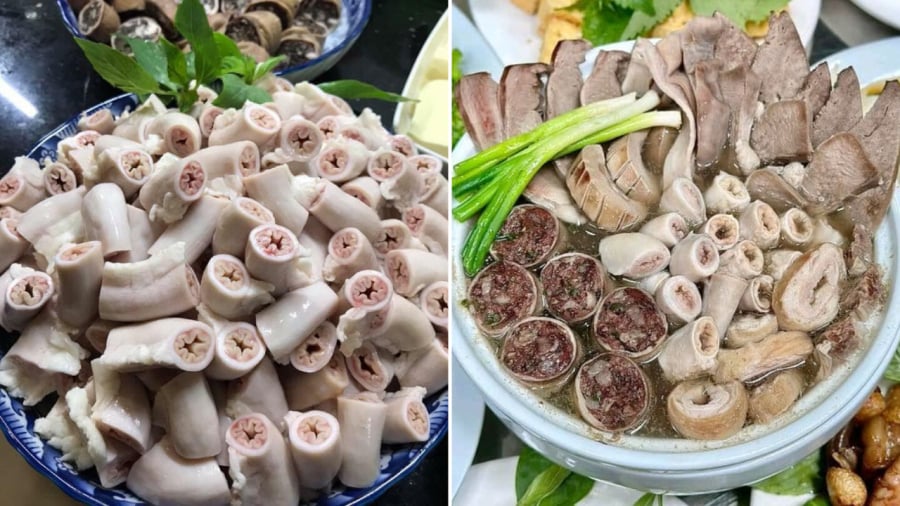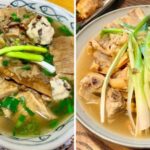Pork offal is a delicacy in many cultures and is used in a variety of dishes such as boiled pork intestines, stir-fried intestines with cucumber, pork organ soup, and hot pot. These humble dishes are beloved by many. Pork offal (including stomach, small intestine, and large intestine) is also considered a medicinal food in traditional medicine. In Eastern medicine, pork offal is known as “trư đỗ,” and is believed to have warming properties and a sweet taste. It is thought to strengthen the spleen and stomach, benefit the kidneys, and tonify deficiencies.
According to VnExpress, PGS.TS Nguyen Anh Tuan, Head of the Digestive Surgery Department at the Central Military Hospital 108, pork offal is a good source of protein, fat, vitamins, and minerals. However, it can also be a reservoir for contaminants from feed and the environment, especially if the pigs are raised or processed unsanitarily.
While pork offal may be a delicacy for some, it is not suitable for everyone. Here is a list of groups who should avoid consuming pork offal:
5 Groups Who Should Avoid Eating Pork Offal
- Individuals with Gout
People suffering from gout should refrain from consuming pork offal dishes. These dishes tend to increase the levels of uric acid in the blood, leading to the formation and accumulation of urate crystals in the joints of the fingers and toes, resulting in intense pain. Additionally, gout patients may experience swelling, warmth, and redness around the affected joints.
If individuals with gout repeatedly consume foods that elevate uric acid levels, not only will their condition worsen, but the excess uric acid may also lead to the formation of urate stones in the urinary tract. These stones can cause obstructions and infections, increasing the risk of kidney damage.
- Individuals with High Cholesterol and Cardiovascular Disease
Pork offal is high in cholesterol, especially the harmful type. Consuming these dishes can lead to elevated cholesterol levels in individuals who already have high cholesterol, putting them at even greater risk.
Therefore, it is recommended that individuals with high blood cholesterol avoid pork offal. If they do crave it, they should limit their consumption to a few bites.
Similarly, individuals with cardiovascular disease, high blood pressure, atherosclerosis, or diabetes should also refrain from consuming pork offal regularly.

- Individuals with Liver Disease
Pork offal is rich in protein and fat, and when consumed, the liver is responsible for metabolizing these substances and detoxifying the body. For individuals with liver disease, such as hepatitis or cirrhosis, these functions are impaired, and consuming large amounts of organ meat can further strain the liver, potentially worsening the condition.
- Overweight or Obese Individuals
Pork offal is high in fat and calories, making it challenging for overweight or obese individuals to manage their weight. Additionally, the high cholesterol content increases the risk of metabolic disorders in this population.
- Individuals with Digestive Issues
Pork offal is not recommended for those with digestive problems as it is high in fat and can cause stomach discomfort, indigestion, and diarrhea. Individuals with conditions like irritable bowel syndrome or inflammatory bowel disease should avoid consuming pork offal.
Precautions When Eating Pork Offal
When consuming pork offal, it is crucial to prioritize food safety and hygiene. Always purchase offal from reputable sources, selecting pieces with bright colors, good elasticity, and no unusual odors or appearances. Properly clean and prepare the offal to eliminate any contaminants and unpleasant odors before cooking.
To ensure safety, thoroughly cook the offal before consumption. Pork offal can harbor bacteria, parasites, and worms, which can be harmful if not adequately inactivated through proper cooking. Consume freshly prepared offal as it has a high protein and fat content, making it susceptible to bacterial growth if left at room temperature for extended periods.
While you may enjoy pork offal, it is essential to practice moderation and not make it a regular part of your diet to maintain a healthy balance.
In conclusion, while pork offal has its culinary and cultural significance, it is not suitable for everyone. If you belong to any of the mentioned groups, it is advisable to avoid consuming pork offal to protect your health. Stay informed and make mindful dietary choices!
“Those Who Should Avoid Eating Bamboo Shoots Soup During Tet”
Canh măng is a traditional Vietnamese dish often served during the Lunar New Year celebrations. While it is a delicious and beloved dish for many, it may not be suitable for everyone. The dish’s unique ingredients and preparation methods may pose potential health risks for some individuals, and thus, it is important to exercise caution when consuming this dish.



































